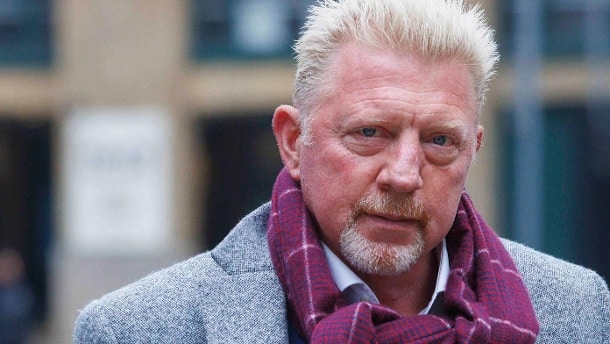Once Boris Becker rushed into the hearts of tennis fans in London. Now he even faces a prison sentence in the British capital in the worst case scenario. How could this happen?
Boris Becker’s fateful places are only separated by about twelve kilometres as the crow flies. Here the Centre Court of Wimbledon, called Becker’s “living room”, where he won the most important tennis tournament in the world three times. There, the windowless room number 3 in Southwark Crown Court, where the fate of the now 54-year-old has been under discussion for days.
In London, the glory and gloom of the former exceptional athlete are reflected. Now the decision-making process begins: on Tuesday, the pleas are expected, in addition, Judge Deborah Taylor will summarise the state of affairs – and then the twelve-member jury must make a decision.
Becker faces up to seven years in prison
Becker has been highly concentrated and visibly tense since the trial began on 21 March. Every day, his partner Lilian De Carvalho Monteiro accompanies him; the couple shows up in the morning holding hands. While his partner listens to the proceedings T20200384 at the edge of the hall, Becker has to take his seat as the defendant in a glass box.
Here at the latest it becomes clear: this is no game. Becker could theoretically face up to seven years in prison. The prosecution accuses him of having concealed money, valuables such as trophies and real estate from the insolvency administrator. The ex-tennis star rejects this.
Crown Court instead of Centre Court: despite the short distance, it was long unthinkable that Becker’s life would one day lead him here. For more than 15 years, the blond raced across the tennis courts, his game was successful and carried away millions of people. He won Wimbledon three times and is still the youngest winner in the history of the tournament. He won the Australian Open twice and the US Open once. Together with Michael Stich, he won gold in doubles at the 1992 Olympic Games, and he led the German team to victory in the Davis Cup. For twelve weeks, Becker was first in the world rankings. He collected a good 25 million US dollars in prize money – plus, he estimates, the same amount in advertising revenue.
Private life is more interesting than his sporting successes
Now it’s all gone. What’s more, Becker is in debt. In trying to pay back money, he took out loans, some at enormous interest rates. The proceedings in London also show how difficult life is for acclaimed athletes beyond the public eye. When Becker sensationally won Wimbledon for the first time in 1985, the 17-year-old from Leimen became a rich wunderkind overnight. A meteoric rise followed. Thanks to Becker – and female counterpart Steffi Graf – tennis was suddenly high in the favour of Germans.
At the same time, expectations and interest increased, also and especially in his private life, in which Becker seemed to be as carefree as on the tennis court, but acted much more unhappily. The fact that he is still appreciated in his adopted country Great Britain as a TV commentator with expertise and good English does not help him much in Germany. There he appears almost only in gossip news, his relationships and affairs have been the subject of ridicule for years. As a businessman, he obviously did not have a lucky hand either.
The trial does not only mercilessly expose Becker’s private life. Again and again, the former superstar talks about the shame of the private insolvency he had to file in 2017. It was “embarrassing” that his case made the news worldwide. The “Becker brand” is damaged, advertising partners wave him off, he has to sell real estate below value.
Becker blames “expensive divorce” for insolvency
But that he deceived his insolvency administrator, as the prosecution alleges in the case of “The Queen v Boris Franz Becker”? No, that’s not true, the 54-year-old insists emphatically in court. He simply did not have an overview of his finances. He was not used to negotiating and concluding contracts. He did not read his mail. He had not known that accounts had been opened in his name, that real estate such as his parents’ house in Leimen had been signed over to him. Explanation: “I was busy travelling around the world and playing tennis.”
Even after his career ended in 1999, little changed. Advisors had been responsible for his money. Only that his income dropped significantly. Nevertheless, Becker spent money. In court he complains about the “expensive divorce” from ex-wife Barbara, for daughter Anna Ermakowa he pays millions in maintenance. Nevertheless, he affords himself a luxury mansion in Wimbledon and a lifestyle to match.
In London, Becker is now fighting for his freedom – and for what is left of his reputation. Prosecutor Rebecca Chalkley has made it clear that she does not believe the line of defence that Becker was simply fundamentally naive. “Everyone is to blame but you,” she scoffs. “Don’t be distracted by the defendant’s celebrity,” Judge Taylor had instructed the jury at the start of the trial. Becker will soon know what that means for him.





